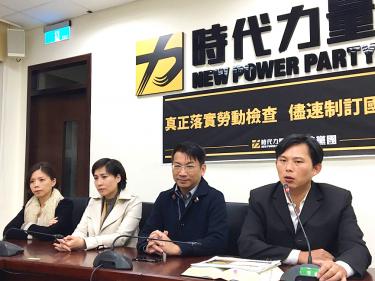Tensions appear to have intensified between Democratic Progressive Party (DPP) and New Power Party (NPP) legislators after a DPP caucus official reportedly called for a review of the parties’ relationship following disputes over amendments to the Labor Standards Act (勞動基準法) that were passed on Tuesday.
“In the end our efforts [to halt amendments] were not enough, but we only owe an apology to workers, not the ruling party,” NPP Executive Chairman Huang Kuo-chang (黃國昌) said. “Over the past two days, I have seen actions that look similar to the way the Chinese Nationalist Party (KMT) used to treat the DPP, but I will not allow us [the NPP] to be reduced to a supporting escort for DPP legislation because of it.”
While the ruling party and the social movement-rooted NPP are viewed as allies in the “pan-green” political camp, tensions between the two parties emerged in July when NPP legislators occupied the convener’s podium of the Social Welfare and Environmental Hygiene Committee prior to a review of the proposed labor amendments.
DPP caucus whip Ker Chien-ming (柯建銘) earlier this week accused the NPP of hypocrisy for advocating a “committee-centric” review of the legislation despite its earlier occupation of the convener’s podium.
He also accused the party of colluding with the Workers Struggle Alliance to disrupt a legislative hearing on proposed changes.
The Chinese-language China Times yesterday reported that the NPP’s stance also drew extensive criticism in a recent DPP Central Standing Committee meeting.
“Right now a lot of members of the DPP caucus are starting to question whether the NPP is a friend or an enemy,” said DPP Legislator Chen Ming-wen (陳明文), who serves as the convener of the party’s electoral strategy committee.
Controversy over the NPP’s conduct during the passage of Labor Standards Act amendments has led to “universal discontent” within the DPP caucus, Chen said.
The two parties had coordinated and cooperated closely before the presidential and legislative elections, avoiding direct competition in most legislative district seat races.
“I would not use abstract nouns like ‘friend’ or ‘enemy’ to describe our relationship,” Huang said, citing judicial reform and pension reform as areas of common ground, while criticizing the DPP for delays on transitional justice.
“Our position is that we completely support any progressive reforms by the new government,” he said. “However, just acting as a rubber stamp would not be living up to our commission from voters.”
Source: Taipei Times - 2016/12/09





















